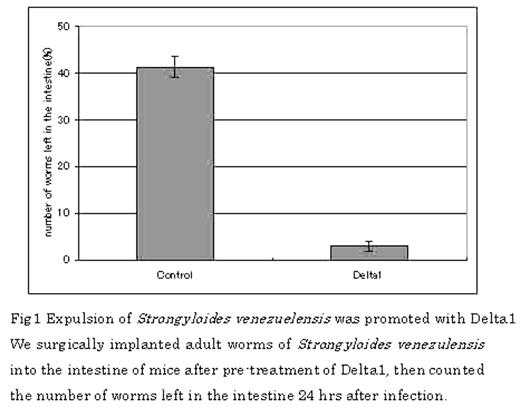Abstract
[Background] Notch signaling is known to be important in hematopoiesis, but very little information is available about its significance in mast cells. Here we provide direct evidence that notch signaling is critical for both development and function of mast cells in vitro and in vivo.
[Methods] A Lin− fraction of mouse bone marrow cells was cultured on immobilized Delta1 in the presence of SCF and IL-3, and emerging Lin−FcεRI+c-Kit+ mast cells were characterized. Next, production of mouse mast cell protease-1 (mMCP-1), which is specific for nematode infection through locally expressed TGF-β1 in vivo, by bone marrow-derived mast cells (BMMC) was analyzed after the stimulation with Delta1 in the presence of TGF-β1. Finally, mice were infected with Strongyloides venezuelensis after pre-treatment with Delta1, and expulsion of the worms was examined.
[Results] Lin−FcεRI+c-Kit+ mast cells developed remarkably earlier if stimulated with Delta1 (at one week, 15% vs. 3%). DAPT, a γ-secretase inhibitor, blocked the Delta1 effect, while it did not affect the regular time-course mast cell generation by SCF and IL-3. SB431542, a selective inhibitor of TGF-β1 signaling, also blocked early mast cell generation by Delta1. Delta1 augmented mMCP-1 expression and secretion from BMMC by 50 fold. Both DAPT and SB431542 showed a dose-dependent inhibition of Delta1 effect on mMCP-1 expression and secretion. Pre-treatment of the hosts with Delta1 promoted the expulsion of S. venezuelensis, (left/inoculated ratios of worms, 3% vs. 40%) while Delta1 had no effect in the mast cell-deficient W/Wv mice.
[Discussion] Our observations reveal that notch signaling regulates both development and function of mast cells in vitro in conjunction with TGF-β1 signaling. In vivo, it is also likely that Delta1 facilitates the functional maturation of intestinal mast cells to eradicate parasites. More precise mechanism of Delta1 action on mast cells in vivo is under a study.
Author notes
Corresponding author


